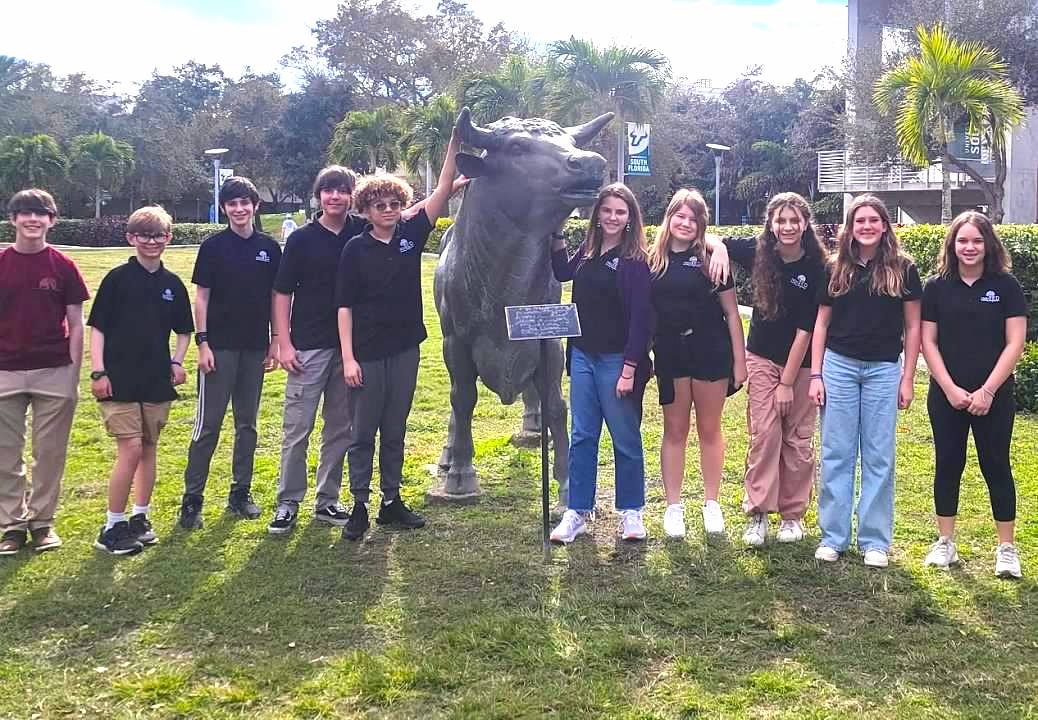My cohort and I had the pleasure of attending two panels at the annual St. Petersburg Conference on World Affairs, held at the USF St. Pete campus. We had lunch in a curated outdoor patio next to the Nelson Poynter Memorial Library, took photos with the bronze bull statue at the front of the campus, and took in the serenity of the harbor as we walked across campus.
The panels were held in the grand ballroom within the Student Center, and our students did an excellent job representing our school through their behaviors, questions, and spokesmanship when the adults inevitably said “you all are so bright and well behaved, tell us where you came from!” By the end of the day, we were all honorary USFSP students, and I couldn’t be more proud of my cohort.
As a result of our discussions prior and time at the (In)Civility and Discourse and Artificial Intelligence and The Arts panels, our students have begun creating the school’s academic dishonesty policy, which includes the rules they believe should be in place regarding the use of artificial intelligence.
A synopsis of the event and its major talking points is included for reference at the end of this – thanks ChatGPT.
Our students have agreed that the use of artificial intelligence, including ChatGPT, is acceptable when used as a tool to support the work, not replace effort, and the student (or teacher in this case) identifies why they used the tool, how much of the work was written by the A.I., and it is cited like any other resource in the writing.
When students were given the opportunity to explore ChatGPT for the first time, I asked them to prompt the A.I. to write a blank argumentative essay outline (“hey, this is basically the same thing you taught us, Ms. Shand” was a particular win for me), then to prompt it to write a 14 line poem on any topic of their choice (a lot of cat, cheese, and pickle poems were made), and finally to enter any kind of prompt they wanted. Students were particularly surprised when they prompted it to write a poem or rap about Indi-ED and it very accurately represented our goals and approach to education. “That’s scary good….” a few of them mentioned. This engagement with ChatGPT gave some students their very first look at A.I. and its abilities. Some students were gleeful and impressed, while others felt shock and slight horror at what the A.I. could do.
We will continue to explore the abilities and applications of Artificial Intelligence in the classroom, and to practice our civil discourse to collectively create a policy regarding the use of social media and artificial intelligence in the classroom, including any repercussions if those rules are not followed while at school. By the end of the year, the students will have a formal policy to present for use in the school’s handbook.
Synopsis of USFSPGAC: the quoted paragraphs below were written by ChatGPT and edited by me (Nina Shand) written in half the time that it would’ve taken me to construct.
“The University of South Florida’s Global Affairs Conference held from February 6th to 8th, 2023, featured a diverse range of speakers and topics aimed at addressing pressing global issues. Discussions covered areas such as international relations, diplomacy, sustainability, and human rights. Speakers included experts from academia, government, and non-governmental organizations, providing valuable insights and fostering dialogue on key global challenges and opportunities.
At the Conference, the panel on Artificial Intelligence and the Arts explored the intersection of AI technology and artistic expression. Experts discussed how AI is influencing various forms of art, including visual arts, music, literature, and film. Topics included the ethical implications of AI in art creation, the potential for AI to enhance creativity, and the role of human-AI collaboration in artistic endeavors. The panel provided insights into the evolving relationship between technology and creativity in the arts.
The panel on (In)Civility in Discourse and Democracy at the Conference delved into the critical relationship between respectful dialogue and the health of democratic societies. Experts discussed the challenges facing civil discourse in today’s polarized political climate, including misinformation and disinformation, the impact of deep fakes, and the erosion of trust in institutions. Topics included strategies for promoting constructive dialogue across ideological divides and the particular role that structures play in facilitating constructive dialogue, the role of social media in shaping public discourse, and the importance of fostering a culture of empathy and understanding in democratic societies. The panel underscored the vital role of civil discourse in safeguarding democracy and promoting inclusive governance.”


